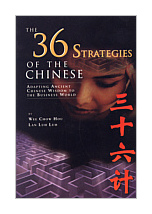|
||
• wydawnictwa polskie
• Zamów informacje o nowościach z wybranego tematu • kontakt
• Cookies na stronie |
THE 36 STRATEGIES OF THE CHINESECHOW HOU W.wydawnictwo: ADDISON-WESLEY , rok wydania 2000, wydanie Icena netto: Without doubt, China is becoming a stronger economic power by the day. The Asian economic crisis which precipitated in 1997 clearly demonstrated the increasing influence of the Chinese on world economy and politics. That China will emerge as a powerful economy in the twenty-first century is no longer a question for forecasters. It is now a reality. Thus, it is imperative that we learn to better understand the Chinese psyche, especially in the realm of business. Despite its modernisation and entry into the free market economy, China's five thousand years of history, culture and value systems still dominate the way Chinese think and behave. Confucian ethics, Taoist influences and other ancient Chinese classics still form valid reference points for understanding Chinese behaviour. Well-known Chinese classics have often been cited as important driving forces in the minds of Chinese strategists. Sun Zi's Art of War, the Annals of the Three Kingdoms, Water Margin, and several other Chinese military classics are good examples. Indeed Chinese war strategies have become topics of research, especially in their application to business. This is not surprising, considering the fact that the Chinese have a saying that the business world is like a battlefield. The "Thirty-six Strategies" are well-known to the Chinese and are frequently applied in business practices. No one can pinpoint the exact period in which the thirty-six strategies were written, nor the exact combinations of strategies that constitute the thirty-six. However, through the years, scholars have expediently adopted the thirty-six strategies as a set of common tactics used by the Chinese. Though widely known and applied by the Chinese, these "Thirty-six Strategies" are less familiar to others. Even less-known are their strong applicability to business. This book attempts to bridge this gap of understanding between the East and other cultures of the world. It seeks to provide a timely insight into the mind of the Chinese strategist. Księgarnia nie działa. Nie odpowiadamy na pytania i nie realizujemy zamówien. Do odwolania !. |


